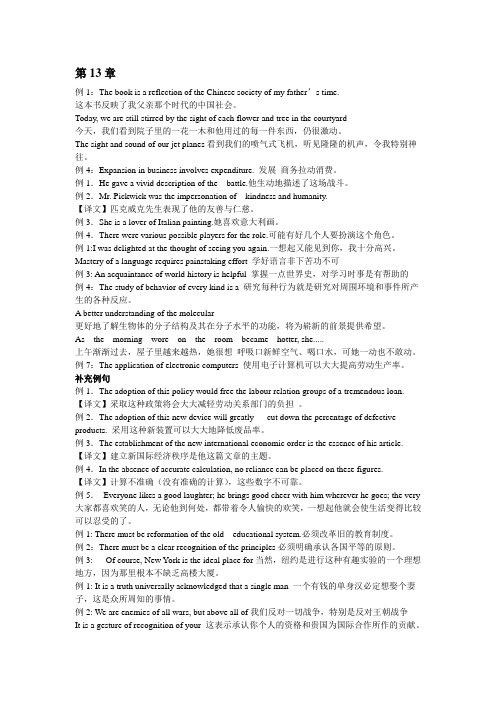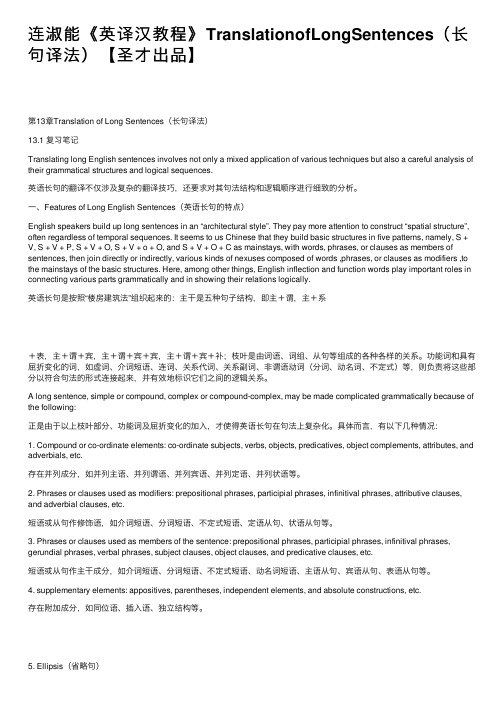汉译英教程第十三章
第十三单元 翻译技巧

2.技巧
英译汉→理清上下文的衔接纽带,然后把句 子切分成短句,调整短句的出现的顺序。 例:1.Human beings have distinguished themselves from other animals, and in doing so ensured their survival, by the ability to observe and understand their environment and then either to adapt to that environment or to control and adapt it to their own needs .
倒拆则是打乱原来的顺序,将
后面的提前译出。例:
It
was a real challenge that those who had learned from us now excelled us. 过去向我们学习的人,现在反而超过了 我们。这对我们确实是一个鞭策。 那些曾经向我们学习过的人现在已经超 过了我们。这对我们确实是一个挑战。
我不是第一个犯错误的人。 犯错误的人多的是,我又不是头一个!
含定语从句的句子:除少数情况外,这类 从句都是长句。在英译汉时,如能将定语 从 句译 成前置 定语, 则尽量 避免其 他译 法;如译成前置定语不合适,一般分译成 一个独立的句子或另一种从句,如状语从 句等。
例:
“Well, there is never anything happened in my family I’m ashamed of.” “嘿,我家可从来没出现过见不得人的事。”
例:
Law enforcement cannot responsibly stand aloof. 执法部门不能负责任地对此不闻不问。
Unit 13 Marriage课文翻译综合教程四

Unit 13MarriageRobert Lynd1 “Conventional people,” says Mr. Bertrand Russell, “like to pretend thatdifficulties in regard to marriage are a new thing.” I could not help wondering, as I read this sentence, where one can meet these conventional people who think, or pretend to think, as conventional people do. I have known hundreds of conventional people, and I cannot remember one of them who thought the things conventional people seem to think. They were all, for example, convinced that marriage was a state beset with difficulties, and that these difficulties were as old, if not as the hills, at least as the day on which Adam lost a rib and gained a wife. A younger generation of conventional people has grown up in recent years, and it may be that they have a rosier conception of marriage than their ancestors; but the conventional people of the Victorian era were under no illusions on the subject. Their cynical attitude to marriage may be gathered from the enthusiastic reception they gave to Punch’s a dvice to those about to marry -“Don’t.”2 I doubt, indeed, whether the horrors of marriage were ever depicted morecruelly than during the conventional nineteenth century. The comic papers and music-halls made the miseries a standing dish. “You can always tell whethera man’s married or single from the way he’s dressed,” said the comedian.“Look at the single man: no buttons on his shirt. Look at the married man: no shirt.” The humour was crude; but it went home to the honest Victorian heart.If marriage were to be judged by the songs conventional people used to sing about it in the music-halls, it would seem a hell mainly populated by twins and leech-like mothers-in-law. The rare experiences of Darby and Joan were, it is true, occasionally hymned, reducing strong men smelling strongly of alcohol to reverent silence; but, on the whole, the audience felt more normal when a comedian came out with an anti-marital refrain such as:O why did I leave my little back roomIn Bloomsbury,Where I could live on a pound a weekIn luxury(I forget the next line).But since I have married Maria,I’ve jumped out of the frying-panInto the blooming fire.3 No difficulties Why, the very nigger-minstrels of my boyhood used to opentheir performance with a chorus which began:Married! Married! O pity those who’re married.Those who go and take a wife must be very green.4 It is possible that the comedians exaggerated, and that Victorian wives werenot all viragos with pokers, who beat their tipsy husbands for staying out too late. But at least they and their audiences refrained from painting marriage as an inevitable Paradise. Even the clergy would go no farther than to say that marriages were made in Heaven. That they did not believe that marriage necessarily ended there is shown by the fact that one of them wrote a “best-seller” bearing the title How to Be Happy Though Married.5 I doubt, indeed, whether common opinion in any age has ever looked onmarriage as an untroubled Paradise. I consulted a dictionary of quotations on the subject and discovered that few of the opinions quoted were rose-coloured.These opinions, it may be objected, are the opinions of unconventional people, but it is also true that they are opinions treasured and kept alive by conventional people. We have the reputed saying of the henpecked Socrates, for example, when asked whether it was better to marry or not: “Whichever you do, you will repent.” We have Montaigne writing: “It happens as one sees in cages.The birds outside despair of ever getting in; those inside are equally desirous of getting out.” Bacon is no more prenuptial with his caustic quotation: “He was reputed one of the wise men that made answer to the question when a man should marry: ‘A young man not yet; an elder man not at all.’” Burton is far from encouraging! “One was never married, and that’s his hell; another is, and that’s his plague.” Pepys scribbled in his diary: “Strange to say what delight we married people have to see these poor folk decoyed into our condition.”6 The pious Jeremy Taylor was as keenly aware that marriage is not all bliss.“Marriage,” he declared, “hath in it less of beauty and more of safety than the single life - it hath more care but less danger; it is more merry and more sad; it is fuller of sorrows and fuller of joys.” The sentimental and optimistic Steele can do no better than: “The marriage state, with and withoutthe affection suitable to it, is the completest image of Heaven and Hell we are capable of receiving in this life.”7 Rousseau denied that a perfect marriage had ever been known. “I have oftenthought,” he wrote, “that if only one could prolong the joy of love in marriage we should have paradise on earth. That is a thing which has never been hitherto.” Dr. Johnson is not quoted in the dictionary; but everyone will remember how, devoted husband though he was, he denied that the state of marriage was natural to man. “Sir,” he declared, “it is so far from being natural for a man and woman to live in a state of marriage that we find all the motives which they have for remaining in that connexion and the restraints which civilised society imposes to prevent separation are hardly sufficient to keep them together."8 When one reads the things that have been said about marriage from onegeneration to another, one cannot but be amazed at the courage with which the young go on marrying. Almost everybody, conventional and unconventional, seems to have painted the troubles of marriage in the darkest colours. So pessimistic were the conventional novelists of the nineteenth century about marriage that they seldom dared to prolong their stories beyond the wedding bells. Married people in plays and novels are seldom enviable, and, as time goes on, they seem to get more and more miserable. Even conventional people nowadays enjoy the story of a thoroughly unhappy marriage. It is only fair to say, however, that in modern times we like to imagine that nearly everybody, single as well as married, is unhappy. As social reformers we are all for happiness, but as thinkers and aesthetes we are on the side of misery.9 The truth is that we are a difficulty-conscious generation. Whether or notwe make life even more difficult than it would otherwise be by constantly talking about our difficulties I do not know. I sometimes suspect that half our difficulties are imaginary and that if we kept quiet about them they would disappear. Is it quite certain that the ostrich by burying his head in the sand never escapes his pursuers I look forward to the day when a great naturalist will discover that it is to this practice that the ostrich owes his survival.婚姻罗伯特·林德1 伯特兰·罗素先生说:“凡人百姓喜欢假装说婚姻中遇到的困难是新鲜事。
新英汉翻译教程13到15课

第13章例1:The book is a reflection of the Chinese society of my father’s time.这本书反映了我父亲那个时代的中国社会。
Today, we are still stirred by the sight of each flower and tree in the courtyard今天,我们看到院子里的一花一木和他用过的每一件东西,仍很激动。
The sight and sound of our jet planes看到我们的喷气式飞机,听见隆隆的机声,令我特别神往。
例4:Expansion in business involves expenditure. 发展商务拉动消费。
例1.He gave a vivid description of the battle.他生动地描述了这场战斗。
例2.Mr. Pickwick was the impersonation of kindness and humanity.【译文】匹克威克先生表现了他的友善与仁慈。
例3.She is a lover of Italian painting.她喜欢意大利画。
例4.There were various possible players for the role.可能有好几个人要扮演这个角色。
例1:I was delighted at the thought of seeing you again.一想起又能见到你,我十分高兴。
Mastery of a language requires painstaking effort 学好语言非下苦功不可例3: An acquaintance of world history is helpful 掌握一点世界史,对学习时事是有帮助的例4:The study of behavior of every kind is a 研究每种行为就是研究对周围环境和事件所产生的各种反应。
汉英笔译基础教程第13章 词语误译[精]
![汉英笔译基础教程第13章 词语误译[精]](https://img.taocdn.com/s3/m/89946c46453610661fd9f41a.png)
×
My only means to success is diligence.
√
分析:原文的“资本”是借喻,实际指“可以 依靠并取得成功的手段”。而英语的 capital 指
money used to produce more wealth or for starting a business,并没有中文那样的引申意思。所以 ,这里的“资本”不能与 capital 画等号。
13.2 专业词汇(科技术语)
充电指示条开始滚动。
Battery symbol is consistently rolling.
LOGO
汉英笔译基础教程
Basics of Chinese to English Translation
LOGO
第十三章 词语误译
Contents
I 13.1 日常词汇 II 13.2 专业词汇 III 13.3 文化词汇
13.1 日常词汇
我不怕冷。
I’m not afraid of coldness.
13.1.2 对目的语词汇的不甚了解
大家都怀疑汤姆是个间谍。
Everyone doubts that Tom is a spy.
×
Everyone suspects that Tom is a spy.
√
分析:doubt 作“怀疑”讲,是“不相信”的意 思;而 suspect 作“怀疑”讲,是指“对……有
13.2 专业词汇(政治词汇)
“台独”的英译是“Taiwan Independence”、 “Taiwan Secession”、还是“Taiwan Separatism” ?
比较平行文本
Separatism:对美国历史上实行的种族隔离政策 有这样的评价:“separate, but equal”(“虽分离, 但平等”)表述中虽然没有用“segregate”,但其 中不言自明,所指的是美国白人和非洲裔美国 人当时所处的种族隔离状态。
综合英语教程(第三版)BOOK2-课文译文 13.第十三单元

Unit 13TEXT有这么一天加夫列尔•加西亚•马尔克斯(Gabriel García Márquez)星期一,天刚亮,暖暖的,没有下雨。
奥雷里奥•埃斯科瓦尔(Aurelio Escovar)是一位没有学位的的牙医。
今天他起得很早,六点钟就开始工作了。
他从玻璃柜中取出一些还套着石膏模具的假牙,然后又取出一些工具,按照大小顺序一一摆在桌子上,就像是展览一样。
这位牙医穿着一件无领条纹衬衫,领口上有颗金色的纽扣,裤子用背带吊着。
身材挺拔而清瘦,可那种心不在焉的样子,好像只有聋子才会有的那种表情。
把这些东西在桌上摆好之后,他把牙钻拉到牙科治疗椅旁边,便坐在椅子上开始打磨假牙了。
他看起来漫不经心,似乎没有想过自己正在做什么,只是不停地干活,即使不需要的时候,他还是用脚给钻床打气。
过了八点钟了,他停下来休息了一会儿,透过窗户看了看天空,两只忧郁的秃鹰伫立在邻家房屋的栋梁上对着太阳晾晒自己的羽毛。
他继续工作着,心里想午饭前还会下雨的。
可是,十一岁儿子的叫喊声打断了他的思绪。
“爸爸。
”“什么事?”“市长问你能不能给他拔牙。
”“告诉他我不在。
”他正在打磨一颗金牙。
他拿起这颗金牙,眯着眼仔细端详着。
儿子的声音从在那间小小的候诊室里又传了过来。
“他说你在,因为他能听到你说话。
”牙医还是仔细地端详那颗假牙。
只有他干完活把假牙放到桌子上时,他才说道:“这下就好多了。
”接着,他又开始操作牙钻了。
他从一个装满必备用品的纸箱里拿出齿桥的几个构件,然后开始打磨那颗金牙。
“爸爸。
”“什么事?”他的表情没有丝毫的变化。
“他说如果你不给他拔牙,他就开枪毙了你。
”牙医不紧不慢,动作极其平缓,他停止踩踏钻床,把牙钻从椅子跟前推开,把桌子最下面的抽屉拉开,里面有一把左轮手枪。
“好吧,”他说,“让他进来毙了我。
”他把椅子转了一下正对着门,把手放在抽屉边上。
这时,市长出现在门口,他的左脸修得很干净,但是右脸就不一样了,肿胀和疼痛,五天都没刮胡须了。
连淑能《英译汉教程》TranslationofLongSentences(长句译法)【圣才出品】

连淑能《英译汉教程》TranslationofLongSentences(长句译法)【圣才出品】第13章Translation of Long Sentences(长句译法)13.1 复习笔记Translating long English sentences involves not only a mixed application of various techniques but also a careful analysis of their grammatical structures and logical sequences.英语长句的翻译不仅涉及复杂的翻译技巧,还要求对其句法结构和逻辑顺序进⾏细致的分析。
⼀、Features of Long English Sentences(英语长句的特点)English speakers build up long sentences in an “architectural style”. They pay more attention to construct “spatial structure”, often regardless of temporal sequences. It seems to us Chinese that they build basic structures in five patterns, namely, S + V, S + V + P, S + V + O, S + V + o + O, and S + V + O + C as mainstays, with words, phrases, or clauses as members of sentences, then join directly or indirectly, various kinds of nexuses composed of words ,phrases, or clauses as modifiers ,to the mainstays of the basic structures. Here, among other things, English inflection and function words play important roles in connecting various parts grammatically and in showing their relations logically.英语长句是按照“楼房建筑法”组织起来的:主⼲是五种句⼦结构,即主+谓,主+系+表,主+谓+宾,主+谓+宾+宾,主+谓+宾+补;枝叶是由词语、词组、从句等组成的各种各样的关系。
Unit 13 Marriage课文翻译综合教程四
Unit 13 Marriage课文翻译综合教程四In his essay on marriage。
XXX XXX。
XXX have always XXX。
He notes that he has never met XXX.XXX XXX。
when XXX may have a more positive view of marriage。
XXX to those about to marry。
which was simply "Don't," as evidence of this cynicism.XXX marriage。
XXX that this is because humans have a deep-XXX。
Marriage。
he argues。
is a way to XXX。
XXX isnot perfect and that couples must work hard to make it XXX.In n。
XXX people have always recognized the challenges of the n。
even if they have different attitudes towards it。
However。
XXX it.XXX marriage。
It seems that the idea of a perfect marriage has always been elusive.As for my own experience。
I can say that I have gone from one difficult XXX。
sung by minstrels。
which mocked the idea of marriage and warned of its difficulties。
While it is possible that these performers exaggerated。
自考英语笔译教材lesson 13 ex
把这个成分提到主题的 位置是为了强调
翻译技法:抽 象转具体 Oh, but all the rules of self-preservation were broken when we saw that little face, filled with the terror of death, being sucked downstream. In an instant, both child and Earl were gone. The boy went home that night, but Earl never came back. • 是啊!不过一看见那小脸带着害怕淹死的恐怖神情被 激流越冲越远,我们就把明哲保身的金科玉律统统打 破了。霎时间,孩子和艾勒都不见了。那天晚上,孩 子回到了家里,艾勒却永远没有回来。 翻译技法:被 动转主动 翻译技法: 正说反译
翻译技法:主转从; 子句浓缩为名词短语
He implied that we had been wrong in attempting such a rescue in the first place. Was he really being critical, or was I projecting my own tremendous feelings of guilt onto him? Or was he simply stating the facts? • 他的言外之意是我们下水救人,本来就不对。他真在 指责我们吗?还是我那极度内疚的心情影响了他?还 是他只不过说出真实情况而已? 翻译技法: 正说反译
翻译技法:省略
“People disappear in that river every year,” one of the policemen said to me that afternoon, half in dismay, half in frustration. He did not seem very sympathetic when he took his report. But the whole city was falling apart. • “这条河里年年都要死人”,当天下午一个警察以一 种无可奈何的神气,沮丧地对我说。在他写报告的时 候,并没有显出多么同情的样子。不过,当时全城却 闹得人心惶惶。
高级英语下lesson 13课文翻译
Lesson Thirteen Work工作究竟工作是幸福还是痛苦的源泉,这可能是一个难以回答的问题。
Whether work should be placed among the causes of happiness or among the causes of unhappiness may perhaps be regarded as a doubtful question.毫无疑问有许多工作是非常令人厌烦的,而且过多的工作总是十分痛苦的事。
There is certainly much work which is exceedingly irksome, and an excess of work is always very painful.然而我认为,只要不过量,对多数人来说即使是最枯燥的工作也比终日无所事事要好些。
I think, however, that, provided work is not excessive in amount, even the dullest work is to most people less painful than idleness.工作给人的愉快的程度多种多样,从仅仅是消烦解闷到产生巨大的快乐,这会随工作的性质和工作者的能力而异。
There are in work all grades, from mere relief of tedium up to the profoundest delights, according to the nature of the work and the abilities of the worker. 大多数人不得不从事的工作本身大都无乐趣可言,但即使是这样的工作也有一些很大的好处。
Most of the work that most people have to do is not in itself interesting, but even such work has certain great advantages.首先,工作可将一天的许多时间占满,人们不必再费神来决定应干些什么,大多数人在可以自由地按自己的愿望打发时间时,常常会不知所措,想不起有什么令人愉快的事值得去做。
Unit 13 篇章翻译(一)
Unit 13 篇章翻译(一)课时:2H教学目的要求:在汉译英中掌握如何恰当地翻译有关旅游的文章。
教学重点:旅游英语口语风格的翻译,背景知识对翻译的重要性。
教学难点:旅游英语中专有名词的翻译。
教学内容:丝绸之路1. 欢迎各位参加“丝绸之路游”,为期两周的游览将成为您一生中最难忘的经历之一。
Welcome to our Silk Road Tour. This two-week tour/ trip/ excursion will (may) turn out to be one of the most unforgettable (memorable) experiences in your life.[丝绸之路游可以翻译成the Silk Road Tour, 但译文中的our 显得更为亲切,因为这是关于为游客服务的内容,起到较好的宣传作用。
另外,汉语预期往往比较率直、绝对、武断,相比之下英语比较含蓄、委婉,可以把“将”弱化为may.]2. 丝绸之路的历史可以追溯到公元前2世纪,当时一名中国官员、朝廷使者张骞沿着这条连接亚欧两大洲的贸易通道出使西域。
The Silk Road can be traced back to (traces back to/ dates back to ) the second century before B.C., when Zhang Qian, a Chinese official and imperial envoy, went on business to Xiyu (the Western Regiion) along this trade route that linked (joined/ connected ) [connecting]Asia and Europe. (结构调整)3. 这条通道源于长安城(今天的西安),一路穿越陕西省、甘肃省境内的河西走廊、新疆塔里木盆地、帕米尔山区、阿富汗、伊朗、伊拉克以及叙利亚,最后抵达地中海的东岸,全程七千公里,其中有四千多公里的路段在中国境内。
- 1、下载文档前请自行甄别文档内容的完整性,平台不提供额外的编辑、内容补充、找答案等附加服务。
- 2、"仅部分预览"的文档,不可在线预览部分如存在完整性等问题,可反馈申请退款(可完整预览的文档不适用该条件!)。
- 3、如文档侵犯您的权益,请联系客服反馈,我们会尽快为您处理(人工客服工作时间:9:00-18:30)。
汉译英教程
第十三章词类的转换
汉英两种语言,用词方式各不相同,同一意思在不同的语言中有可能使用不同类别的词表达。
如汉语中可用形容词作谓语,而英语必须用动词;汉语单句中可有几个动词。
而英语单句中谓语动词通常只有一个,其它汉语用动词的地方,英语中只有变换方式。
因此,汉英翻译时不可能总是保持原文词类的原貌,而须根据英语的甩词习惯选择词类。
现将常见词类转换现
象介绍如下:
第一节汉语动词的转换
一、转换成英语名词
1.汉语中做主语、宾语的动词英译时可译作名词,这时的名词一般都表动作意义或是动词
转化来的名词。
如:
a)我们也认识到越来越需要使某些经济部门实行工业化。
We also realized the growing need and necessity to industrialize certain sectors of the
economy
b)采用这种新装置可以大大地降低废品率。
The adoption of this new device will greatly reduce the percentage ot defective products.
c)一切爱好和平的人们都要求禁止原子武器。
All peace loving people demand the prohibition of atomic weapons
2.汉语的一些动宾短语,英译时可采用"名词+of”引导的短语的结构。
如:
a)他一生的真正使命是想办法为推翻资本社会而作出贡献。
His real mission in life was to contribute,in one way or another,to the overthrown of
capitalist society.
b)看到这张照片,我想起了我的童年。
The sight of the photo brought me back to my childhood.
3 根据英语句式的要求转译为名词
a)在城市和乡村,托儿所和幼儿园都在大量扩展。
There has been a tremendous expansion of nurseries and kindergartens in both town and
villages.
b)骄傲自满最终毁了他。
Arrogance and complacence turned out to be his ruin.
c)一切旨在保证国际机构特别是联合国机构进行工作的便利条件必须恢复。
There must be restoration of all the necessary facilities for the functioning of international
organs,particularly the United Nations
4.政论文章和科技文章中,汉语动词转译为英语名词的现象比较普遍。
如:
a)要把控制人口、解决资源、保护环境放在重要位置。
Population control,the conservation of resources and environmental protection should be put in
an important place.
b)他们片面地注重重工业,忽视农业和轻工业,因而市场上货物不够,货币不稳定。
Their lopsided stress on heavy industry to the neglect of agriculture and light in dustry results in
a shortage of goods on the market and an unstable currency.
这种文体使用无生物类名词主语居多,汉英主语的变化,造成词类的转译。
a) b)两例皆届此类,这也是翻译政论,科技文章对应注意采用的一种技巧。
二、转换成英语形容词
1.汉语中表示知觉、感情、欲望等心理状态的动词,英译时可利用be+形容词”的结构。
如t:
a)他非常清楚自己的缺点。
He is quite aware of his shortcomings
b)他不满足于自己现有的成就。
He is not content with his present achievements.
c)工人们确信篮在短期内一定能建成这座现代化工厂。
The workers are confident that they will be able to build the modern factory in a short time.
这类动词常见的有:
害怕,担心afraid 感谢grateful/thankful 切望anxious 不知道ignorant
觉察,知道aware/conscious 遗憾sorrv
当心,注意careful 熟悉familiar
满足content 怀疑doubtful
确信confident/certain/sure 高兴glad/delighted
渴望、eager 嫉妒envious
2 汉语中有相当一部分动词英译时可换成be+形容词+介词短语。
如:
a)我们缺乏原材料。
We are short of raw materials.
b)他精通天文学。
He is apt at astronomy.
c)你的月票还能使用三天。
Your monthly ticket is good for 3 more days
三、转换成英语副词
汉语中动词有些可译成英语中的副词作表语或宾语补足语。
如;
a)我们到时,电影已上演了半小时了。
By the time we got there,the film had been on for half an hour.
b)他忘记关窗子,让雨潲了进来。
He forgot to close the window and let the rain in.
c)“放我出去”,房间里的孩子叫道。
“Let me out?”the chlid in the room cried
四、转换成介词或介词短语
英语中介词很多,用途很广,而且有一些介词本身是由动词演变来的,具有动词的特征。
a)穿红衣服的女孩是英语系的学生。
The girl in red is a student of the English Department
b)反对这个建议的人请举手。
Those against the suggestion,please raise your hand.
c)这篇文章我看不懂。
This article is beyond my comprehension.
d)布朗一家正在国外度假。
The Browns are on their holiday abroad。
